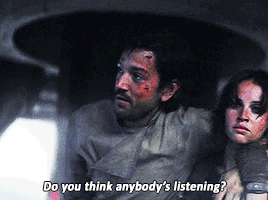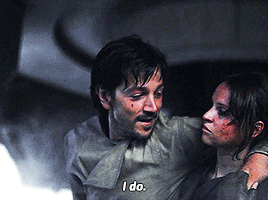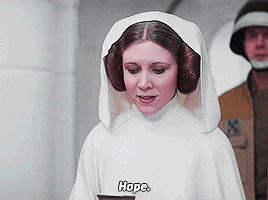Don't wanna be here? Send us removal request.
Text
Verso mentions in a cut scene that sometime after the Fracture, his hair abruptly turned white, what are the odds that coincided with Alicia going greyscale?
I don't think this really holds up, but a theory I kick around is that Painted Alicia is really Re-Painted Alicia, and the Original Painted Alicia was both in color and unscarred
Aline was permitted some time to grieve in the canvas before Renoir became desperate to extract her. She was not the same woman we fight on the top of the Monolith then. She was lost in grief, but was she *that* lost? She blamed Alicia for what happened, but did she want to punish Alicia more than she wanted to bury her head in the sand altogether? Would she really step into the canvas and on day 1, with absolutely no opposition or outside pressure, deliberately paint a big inescapable undeniable reminder of the worst anguish she'd ever experienced?
If Aline originally painted Alicia with scars (forget greyscale for now/see tags), what is the in-canvas explanation for this? The Painted Family lived, loved, etc in (Old) Lumiere. There would *have* to be an explanation for the rest of the family and the neighbors. Another fire? Would she have made herself live through even half the trauma again just to build the set? Or, would it have been easier both technically and emotionally to instead paint her family exactly as they were on December 32nd, and let them resume their lives as she felt they deserved to live them.
Which includes Alicia, because Aline does love her despite everything. They may never have been close, they may never see eye to eye, and Aline definitely was never mother of the year, but on this day 1, when her only goal is to banish the family's pain and grief, that includes Alicia's.
So say she originally painted an unscarred and full-color Alicia, and it was only when her reclaimed life began to fall apart again that she lashed out and painted over her daughter, stealing her color, scarring her face. Renoir wanted Aline to face reality so bad? Well, how about *that* for reality. The Painted Family becomes then as the real one is: fractured. Clea lost to them, Verso caught in a web of grief, herself and Renoir at war, Alicia set apart and in pain.
And about the greyscale, there are only 2 other people like that: Painted Clea and Simon, both known to have been repainted. When (Re)Painted Clea is defeated, her eye is shown returning to its normal color because the re-painting is only a veneer; inside, she is still as Aline made her originally: in color.
And when Painted Alicia asks Maelle to send her back to her family, which is very conspicuously the the *only* time she's shown opening her mouth? Her tongue is pink.
32 notes
·
View notes
Text
In my (probably-400th) rewatch of Rogue One, I realized that, when they're trying to call off the Rebel squadron, Cassian tells Kay "Jyn's on that platform". But what's the message that Draven gets, the message that causes him to try to call off the hit?
"Alliance personnel are on site"
Jyn is NOT Alliance personnel. The only person on Eadu that Draven would interpret "Alliance personnel" to mean is Cassian, and THAT'S why he calls off the hit. Jyn doesn't matter once they've found Galen; he would never stop the squadron for her.
Anyway, new headcanon that Kay maybe slightly fudged the details because he knew it was the only possible way to save Jyn. (He would never admit it though)
(Alternate headcanon: Kay heard Cassian yell "Jyn's on that platform" and was like 'This idiot is absolutely going to try to pull some hero nonsense, so even if he's not up there NOW, he will be in approximately 3 minutes')
#star wars#rogue one#jyn erso#cassian andor#k2so#Kay's always got Cassian's back#even if he disapproves
265 notes
·
View notes
Text
Hate Hate Hate stories that reward characters for refusing to do triage. 'I refuse to choose only one to survive even if it means both die' [plot contrives for this to be the only way both survive] is so weak. Making difficult decisions with no good outcome is not a moral failing
14K notes
·
View notes
Photo




Tuvok’s promotion
3K notes
·
View notes
Text
I feel like we as a society don't talk enough about how hard Cinna snapped when the Quarter Quell was announced
1K notes
·
View notes
Note
hi! Visages anon wrestling my social anxiety into submission to come off anon for an actual reply. also, this is very long and rambley.
sorry not sorry about making you sad, but the thought hit me like a truck and I had to share it. and, it does kinda hold up. there’s a lot of guilt going around about Verso and it informs a lot of the story. Alicia (and others) drawing a direct line from something she did to the fire that killed him, Renoir’s ghost implying it was an old rivalry/feud that his generation should have dealt with before their kids got tangled up in it, even some of Aline’s hyperfocus on him in the Canvas can be read as the fact that she was a leader among them who didn’t address a threat properly and it had very personal consequences.
the Dessendre’s are a mess, individually and as a group. I too try to avoid Discourse (there are some…questionable takes floating around that have made me back away slowly) so I’m not really sure what the consensus is but I read the family as, prior to the fire, loving and fairly close, but struggling to really see eye to eye with one another in a lot of ways. Aline seemed to be the stricter parent of the pair, but Renoir is also said to coach everything in parables and hidden lessons which can be irritating and while I got the feel the Aline and Renoir were a pretty solid Team until grief split them, that doesn’t mean everything between them was always perfect. I got the impression the Clea was similar to her parents in ways that made them both understand each other but also butt heads and made the places where they were different really stark and difficult to deal with, while Verso was something of a people pleasing peace maker buffering his family’s harder edges. which kinda works with their chosen arts: Clea as a sculptor has a vision and its form is set, while Verso as a musician is more adaptable. Alicia seems a little the odd one out with literature but honestly, that actually tracks with my sense of her as a much younger sibling struggling to find her place in an established family dynamic?
you mention the ghost on Sirene’s island and what that meant with respect to the pair of them drifting apart. I kinda read it as the withdrawal happening after the fire. we don’t get an exact timeline, but I felt that the fire was some months prior to the game, long enough for Alicia to physically recover and for repairs on the Manor to be underway but not so long that it’s not still very fresh. Aline’s withdrawal would have likely begun during the time they were all distracted by the aftermath and based on her own journal, it seems to me that it started slowly. that journal implies that she created the Painted Dessendre’s and only spent little snippets of time with them at the start, but that like with any addiction, it didn’t stay small and eventually it consumed her. Renoir didn’t notice her slipping because of everything else until she was too deep in it to pull out.
the favorite child conversation is a little…not quite sure what my opinions are on that one. with Renoir, it seemed like Clea might have been the one he understood the best, Verso perhaps the one he understood the least, and Alicia the one he was perhaps softest with as she was the youngest and still growing into herself? Aline’s relationship with her kids is difficult to pin down as we rarely see her and when we do meet her she’d not exactly firing on all cylinders. I’m not trying to excuse her setting Maelle on fire, that was monumentally fucked up and has no excuse, but I think it’s clear that the extended time in the Canvas is having a detrimental effect on her mental state, not just her physical health. I think it would be easy to say Verso was her favorite, but sometimes I think that that’s too easy? she’s certainly fixated on him right now, but he’s also the one who recently died in a fairly traumatic manner so…it’s a little hard to say for sure. I also go a bit back and forth on her painting Alicia with her scars. on the one hand, yeah it’s kinda cruel but on the other, it is the truth of her flesh and blood daughter’s reality so I think it can be interpreted in multiple ways.
which, kinda a running thing in the game? Painted Renoir’s line about it being a kindness not a cruelty after killing Gustave applies to so many characters and actions where individual perspective dictates if that character/action might be cruel, kind, or even both. everyone and everything here is messy and contradictory in very real and human ways.
re: Aline blaming Alicia, I think that comes back around to guilt and projection. Alicia clearly got involved in something that went very badly, but both Renoir and Aline allude to the idea that the situation as a whole ought to have been handled better by them or their peers and they both have their own guilt about it. seems to me that Aline is projecting a lot onto Alicia but also that she knows that and knows that it’s irrational. unfortunately, emotions don’t have to be rational and doubly unfortunately, you kind of have to feel them before you can manage them properly and feeling them/managing them is a thing that Aline is quite specifically not doing and it shows in her behavior.
don’t know how coherent any of this is but I kinda ran out of steam so here it is and I'm gonna hit post before I overthink myself out of it. also: I would love to read all of your tangents if you ever feel like making them their own posts.
hi! anon of the Visages/Renoir analogue question.
firstly, yes those were the two I was thinking about.
secondly, I am actually just as unsure as you are about it. I kinda think there's solid evidence for either read, and now I am also really curious if the Hauler had an analogue in it or not and what either that might say about the Dessendre's. it's difficult to try to piece together the out of Canvas family dynamics b/c it's pretty much entirely told to us through implication, unreliable narration and the twisted lens that is the aftermath of the worst day of their lives and the absolute wreckage it made of them.
I suppose it's possible that that's the reason Visages doesn't have a helper: Verso's dead. Renoir can't be there for him anymore in any way, shape or form b/c Verso's not here. Renoir can't help him, Renoir can't be with him, and even in this painted parable, he can't imagine himself in any sort of support role with respect to Verso b/c he can't escape the belief that he wasn't there at the moment when Verso really, truly needed him the most and wow, I just made myself really sad.
kinda ended this on a depressing note, but I hope it gives you more to chew on! love to hear your thoughts on it
yay, you're back!
And you made me sad, too :(
But also, you made me very excited to rant about the Dessendres for a while.
I think you're onto something with Renoir and his missing analogue in Visages. The Fading Man repeats twice that "I would have traded my years for his." He'd have given anything, done anything, to keep his son alive, and yet he couldn't help him. And he says that Verso "paid the price for our hubris." That whole conversation is drenched in guilt: that Renoir (and more importantly Aline and the Painters' Council, I assume) first provoked the Writers and then failed to protect Verso from them. Couldn't even be there to die in his place.
I so agree about the Dessendres, as well. Each of them is so individually complex! How can we really deduce anything about Renoir unless we understand his artistic philosophy and what that suggests about the clues he leaves behind in the Canvas... but how can we understand his artistic philosophy without first knowing something about the man? And then, as you say, we're looking at the shattered wreckage of the family and trying to extrapolate back into normality.
But the family dynamics. I'm fascinated. I don't hang out in the tags very much at the moment so I might be mischaracterising the Discourse, but my sense is there's some consensus the Dessendres were an incredibly close, loving family. There's lots of evidence for that, all over the game and the soundtrack.
But I don't know. I like the idea that the family was struggling a bit. That there was a lot of love, but also fractures. Partly just because that satisfies my own particular taste for angst: I think losing a deeply loved person at a moment when the relationship is damaged is uniquely tragic. To be cheated out of the opportunity to reconcile and always wonder if they even knew you still loved them. Awful. And if that was the case, it only increases Renoir's desperation to save Aline's life, because they've been fighting for decades in this Canvas. What if she, too, slips away before he can save her? Before he can make things right between them?
But I do think there's some actual textual (or at least subtextual) support for some very complicated family dynamics, though. I haven't nailed down a Unified Theory of the Dessendre Family, but here's some speculation about the possible fault lines and what evidence there might be for them.
Artistic sensibilities
We know for a fact there's conflict between the Writers and the Painters. And I've really latched on to the idea that, in a world where artists can literally create and destroy worlds through their art, one's preferred art form becomes really salient to one's identity, politics, and spiritual/philosophical beliefs. I've yammered on at length about Verso's musicianship as it relates to his personality and his relationship with Renoir, but I'm toying with the idea that this extends to the rest of the family, too.
The manor is full of instruments, books, and sculptures, not just paintings. And these are scattered through the house; Alicia's isn't the only large collection of books, Verso's isn't the only room with an instrument. It's pretty clear the Dessendre family appreciated other forms of art than painting, and probably all of them practiced other arts. But we know Verso's greatest passion was music, Alicia's literature. I think we can infer some preferences for the rest of the family and speculate from there.
Both Aline's tremendous skill and her former leadership of the Painters' political organisation suggest she devoted herself primarily to painting. I can't think of any particular evidence, but I suspect Renoir's primarily a painter, too. I think his love of Aline and their shared creative work are all bound up together. He and Aline are a unit, and that unit paints.
That leaves Clea, the only Paintress skilled enough to paint over somebody else's creation. But we know she also sculpts, and I can't remember if it's canon, fanon, or somebody's headcanon but somewhere along the line I've become convinced that sculpting is her preferred mode. (Maybe I got that idea from this post, which doesn't actually claim its her favourite, by @linka-from-captain-planet who has pretty much singlehandedly shaped my thinking about Clea).
So to wildly speculate! I'd draw a loose fracture line down the middle of the family with Verso and Alicia on one side, Renoir, Aline and Clea on the other. Literature isn't a performance, which I think is an important difference between music and painting when it comes to Verso and Renoir's relationship. But it is, like music and theatre, an unfolding narrative that you experience over time in a manner determined by the artist. The writer guides you through a story, concealing and revealing information as they choose. And at the end of the story, some part of the storyworld has changed. By contrast, painting—and sculpture—capture images, moments, static representations of beauty that you can gaze at however you like.
I've combed through my likes looking for this post and can't find it, so apologies to whoever I'm stealing this idea from: somebody speculated that while the Painters create worlds, the Writers' powers might have more to do with manifesting events within their own worlds. I'm not sure I have a strong opinion on what the Writers' special powers actually look like, but I do like the idea that these sorts of differences in the experience of creating and consuming art have very fundamental implications for how the different artistic factions see the world and each other. And how the individual Dessendres do.
Of course, there's plenty of arguments against this reading or for a version of this reading that puts the fault line somewhere else. Clea potentially throws a fairly large wrench in the works, but that's another post.
Aline and Renoir
Love affair for the ages, absolutely. But the Fading Man on Sirène's island makes me think perhaps there was something happening before Verso's loss. He wonders
"What I missed… that might have changed things. What is it that I didn't see? That I couldn't make myself see? ... When did she start pulling away…"
This might just mean he regrets not seeing how much Aline was drowning in her grief, but unless several months or more passed between Verso's death and Aline's retreat to the canvas, it sounds more to me like regret for a gradual pulling away without a clear inciting incident.
(I think he has to be talking about Aline, here, given the location. But maybe "she" is Alicia? And he regrets not seeing a change in Alicia, a drift towards the Writers that would set the stage for the catastrophe that befell the family. I don't think this is the case, but everything in this game is so ambiguous, it's such a fun sandbox to play in.)
Parents and Children
Painted Verso and Maelle quibble a little during the Reacher over whether Clea or Alicia was Renoir's favourite; Verso's name isn't even thrown in the ring.
So did Renoir have a favourite? I think perhaps he was closest to Clea, if only because she was the most like him and she loved to challenge him (thank you @athenas-only-daughter for assembling the Clea post from which I'm stealing this point!). But maybe challenge is something he loved about Verso, too: that in spite of their different ideas and difficulties understanding one another, Verso presented him with new ideas, new understandings of art, new ways of being.
But then again, Renoir's analogue is hard at work building Alicia's wings; there's no Renoir analogue with Verso's axon and we don't know about Clea's, before its death. I tend to think Renoir didn’t have a favourite, but you could make the case for any of them.
I think Aline did have a favourite. And it definitely wasn't Alicia.
Because what the fuck, Aline.
When we meet Aline in the monolith, she believes (or is trying to convince herself) that Maelle is not Alicia but a painted version made by Renoir. But even if she believes Alicia is safe at home, it's wild to me that she was able to watch someone who looks just like her daughter suffer in a fire, just as her daughter had, by her own hand. Presumably, she was willing to watch that someone die in that fire, because she makes no move to douse it until painted Verso puts himself at risk of the flames.
Yes, painted Verso is now the only Verso; maybe that matters here (not to me!). But she knows he's painted and she knows he's immortal. And while she'll watch Maelle suffer and die, she can't bear to relive Verso's death.
I'm not arguing that Aline is evil or a terrible mother. I think it's quite possible that her anger at Alicia is to some degree justified; we have no idea of the details of Verso's death. Even so, Aline's journal entry suggests that she knows its unfair to blame Alicia for Verso's death; maybe part of her motivation for clinging to the Canvas is that she doesn't want Alicia to have to live with a mother who cannot forgive her. @obibail posits in this post that Painters would have to develop some mental distance from their creations, and so perhaps Aline, despite living for some time with the humans she created in this world, skews more towards Clea on the question of their personhood. Perhaps all the humans of the canvas, even painted Verso, are just shadows to her, a poor facsimile of her real life, only worth enduring because even a poor facsimile of Verso is worth having.
I don't know. I'm the sort of person who cannot make the evil or mean choice in video games because I can't bear to hurt the little pixel people's feelings. I find it difficult to understand, even given that paragraph of justification, Aline's indifference to Maelle's pain or that she gave her own painted Alicia the scarred face or damaged throat. The only way it makes any emotional sense to me is if Verso was her favourite and something was already wrong in her relationship with Alicia.
(Sidebar: Just proofreading this and then definitely hitting post before my dogs spontaneously combust because I've been ignoring them so long. But I went back to check the Fading Man dialogue for the paragraph way up top about Visages. I hadn't quite twigged until now that, at least from Renoir's perspective, the Painters either started or renewed the conflict with the Writers. Another datapoint RE Aline placing sooo much blame on Alicia but I realllllly have to wrap up!
Perfection
There something here that means something about the family, but I'm not sure what. The word perfection is constantly coming up: Clea seeks perfection, Renoir counsels her against it, Verso fails to achieve it, but Clea is perhaps, still jealous of him? Perfection is Painted Verso's battle mechanic; Maelle's fighting style is precise and graceful—perfect. Can art be perfect? Should it be perfect, or is there beauty in imperfection?
Whew. I don't know.
OP, it's been four hours since I sat down to answer you and I am forcing myself to stop here. I've cut paragraphs upon paragraphs of tangents, started a couple of drafts and added points to a few more that have been languishing a while.
Which is to say, thank you so much. Both of your asks have given me tons to chew on AND gotten me to sit down and do the writing part, without which my thoughts are an incoherent jumble. Come chat about this game anytime!
(Edit, fifteen minutes later, remembering to FINISH the proofread I began: added some transition sentences, fixed a couple typos.)
38 notes
·
View notes
Photo

“That was very rude.”
Fjord threatening Iver. Episode 120 - Contentious Company.
488 notes
·
View notes
Note
#Critical Role#and just to support Utility's final point more#my primary stance watching C3 was that nobody had an Actual Good Reason why there should've been this dramatic status quo change#and why things shouldn't have just started and broadly stopped with stop Ludinus & get a proper lockdown in Predathos#Like Predathos being locked inside Ruidus seems to have worked out pretty fine for millenia#so it honestly probably shouldn't have changed largely beyond proper guards for stopping the release of Predathos#long post (via prev)
Finally had time to watch divergence and the Strife Enperor-> it’s bad folks, and with the C3 ending, it’s hard not to put it together, but it did make me wonder. Between Ludinus’s plan vs what BH did, are parts of Ludinus’s plan better? In terms of consequences?
Because Predathos really wouldn’t have harmed anybody after eating the gods. Except he would’ve eaten the Betrayers too. So the possibility of wars and cults and a new doom era on Exandria wouldn’t happen. And the Primes would die but magic is still existing and champions like Vax would still be around and it’s based on faith so cleric stuff would still happen? If Zerxus could do it and be a paladin, why not the champions?
People losing their gods permanently is awful and I’ve never agreed with the arguments calling for their deaths, but in light of Divergence so far, I can’t help but wonder if Predathos eating all the gods vs. all gods coming to Exandria and the cycle beginning again, what would people at large have chosen if given the choice.
So: in case you did not notice, my "anyone in this fandom know rhetoric" current cause has been a litany against pure hypotheticals/what if the world was made of pudding type arguments. I find most defenses of Bells Hells rely on those in ways I do not find believable (ie, no, I do not think Vasselheim was going to launch a holy war and Groon and Ophera's behavior towards Vord indicate this really wasn't on the table; no I do not think Rudiusborn nor Ruidians were going to be killed; the lack of consequences in the finale in fact destroy the idea that Bells Hells are the poorest meow meows because the most they get is slightly harsh language). So this, which relies entirely on a hypothetical, is tough to answer.
With that said: No, I think people at large would not have chosen this, for the following reasons; if they did it probably would have gone badly; and I think you have a reading of the events of Divergence that are, shall we say, unique.
Piece by piece: "Because Predathos really wouldn’t have harmed anybody after eating the gods."
Probably true, though very poorly portrayed in the campaign, in that Predathos clearly can see Bells Hells well enough to attack them with accuracy and even swallow them, but does leave when there are no gods present (the implication being that mortals provide no sustenance and Predathos is only interested in attacking them when they get in its way...but they do get in its way). I think the better question, and again, hypothetical, is how long it would take to eat the gods, and harm done during that period - Predathos got two before, but was sealed before it got to the others, so this does seem to be a thing that takes time. Presumably either the Primes would have brought down the gate or Predathos would have chewed through it, and during that time, who knows how many mortals would have been collateral damage of the gods or of mortal fighting. Would Predathos have harmed people directly? Probably not, unless, as mentioned, people got in its way, which many probably would.
"Except he would’ve eaten the Betrayers too. So the possibility of wars and cults and a new doom era on Exandria wouldn’t happen."
Objectively false for two reasons: First, it is confirmed by the Campaign 3 finale that Tharizdun does not read to Predathos as the same divinity and presumably would not have been consumed, and therefore one of the main pantheon would have remained: the horrible ravening void, with no gods left to maintain its chains and no Divine Gate behind which it is sealed [assuming that holds it, which, if its divinity is different, does the Divine Gate even do anything here, particularly since iirc it's said that Tharizdun is theorized to be able to break it even if it were intact]. Similarly, the Luxon is still around as are all kinds of lesser but still god-like entities, good, ill, and otherwise (Uk'otoa, Vesh, Artagan, Xalicas, etc). Secondly...I am trying to be kind here, but based on a broad understanding of human nature and how groups of people historically respond in the face of drastic upheaval, and the fact that in our real world with no confirmation of any deities whatsoever, cults are a real problem...is this your first day on this lovely blue marble we call home. And when we put these two things together? I expect Calamity 2 Except This Time It's An Angry Phoenix Who Lost Its Rider. I mean it will probably be shorter and not quite as lethal, but still pretty fucking bad, and that's assuming Tharizdun doesn't get out.
"And the Primes would die but magic is still existing and champions like Vax would still be around and it’s based on faith so cleric stuff would still happen? If Zerxus could do it and be a paladin, why not the champions?"
I think there would still be clerics and paladins in the world; however, many would probably lose their powers, depending on the source. I should also note that if you see clerics and paladins as healthcare providers, the idea of "no don't worry! We're only reducing the clinician workforce by 75%, there's still people" immediately becomes obvious as a moronic statement. I should also note that paladins formerly of a god might have something of a chip on their shoulder. Vengeance is, famously, a paladin oath. What happens when you de-power a bunch of clerics and you now have a bunch of former Betrayer paladins fueled primarily by hatred and rage (and hopefully enough former Prime paladins invested in stopping them and not mad at the populace).
People losing their gods permanently is awful and I’ve never agreed with the arguments calling for their deaths, but in light of Divergence so far, I can’t help but wonder if Predathos eating all the gods vs. all gods coming to Exandria and the cycle beginning again, what would people at large have chosen if given the choice.
I'm keeping this brief but I think the message of the Calamity (in which, to be clear, the Prime Deities' interests were their own survival and the survival of mortaldom, with the understanding that saving everyone is impossible in the face of the Betrayers' desire to kill all mortals, and them if they stand for mortals) and Divergence is "Violence is to be avoided when it can be avoided, but to treat violence as inherently wrong as an option when the alternative is your own or your community's destruction is to doom yourself." I do not think anyone in the context of Divergence is saying "HELL YEAH I LOVE THIS CATACLYSMIC DEGREE OF VIOLENCE" (fans will say this, myself included, because, and I cannot stress this enough, it is pretend and I do not feel as though cheering the demise of a vampire hobgoblin who slaughtered someone in the forced labor prison camp is like, a problem); I think the characters of Divergence are saying, basically, what Brennan did: "Many of them are weak, and it should not be asked of them to be brave. If they are not asked to be brave, it is possible that they will watch the brave quickly die."
I also just think that again, looking at human history and what I know of psychology? Your average person does not like fuss and they often do not like actively choosing real, drastic change. They may find they like that change when it occurs, but many, many people just want to keep going with things as they are. I mean, look at how ignorant Bells Hells are and then look at the world at large; most people probably are like "well there hasn't been a Calamity in 800+ years, the gate seems to be working, I'm done." Whether or not the status quo is good is one thing; but status quos do tend to be, if not popular, frequently supported over the unknown in the general population. It is radical to prefer change - and I don't think that preferring change is bad! But it is a minority verging on fringe position much of the time. I suspect if you'd taken a vote of all Exandrians they'd be like "stop the weird lights in the sky and go back to how it was."
37 notes
·
View notes
Text
Dorian kinda agreeing with Ludinus is so fucking juicy because YES that's exactly what Ludinus has been doing - with Bor'dor, with Liliana, with most of those in the Vanguard
Get people who have been slighted or hurt - most preferably recently, and most preferably by the Gods themselves - and go on about wouldn't it be better if the Gods were gone? If what had happened to you wouldn't have happened?
And of course they would agree! That would have been better! It would have been better if your brother hadn't died! Who can argue with that?
EXCEPT
That's equating two things that aren't the same. It's a short cut, based on emotion. It's a fallacy. It's an easy solution to a very complex problem, and if your hurt and tired that's exactly the thing you want to hear.
So you (Dorian) don't think about the fact that as a lvl 14 Bard you have far more power than most other mortals in Exandria (but that's just natural right?). You don't think about the fact that it was you who wanted to keep the crown in the first place (back when it was just a thing). You don't think about the fact that Cyrus was in debt because of mortals, not Gods (do we get rid of them too?)
Because if you can just blame the Gods, you don't have to blame yourself
619 notes
·
View notes
Text
I'm sorry but like, the armies of Vasselheim are entirely in the right in immediately trying to stop the Bells Hells from reaching Exandria because from their perspective, these assholes are about to do the one thing this entire military operation was created to prevent: releasing the God-Eater.
The party expressly choosen by all the leaders of the world to save the day and stop Ludinus Da'leth's plan of releasing the God-Eater have instead decided to go entirely off book and release the God-Eater.
Literally every terrified and threatening reaction the party recieves from Vasselheim, Vox Machina, the Air Ashari, the Kryn, all the people they called their allies going into this is entirely justified because the Bells Hells have proven that they cannot be trusted at their word.
322 notes
·
View notes
Text
Humans are unstoppable...Until they aren’t.
I’m not the most eloquent writer, but I’ve had this idea kicking around for a while and figured I’d put it out into the universe.
A lot of the basis for the “humans are space orcs” stuff is the idea that we’re pretty durable compared to many species, yeah? When it comes to physical trauma, we can bounce back from most things that don’t kill us outright, especially given the benefit of hypothetical space-age technology, and adrenaline is one heck of a drug when it comes to functioning under stress.
But that doesn’t make us unkillable, and even though we can survive debilitating injuries and not die from shock, it doesn’t mean it’s fun. Dying of shock sucks, but at least it’s probably quick.
So - Imagine a ship, adrift in space, slowly being drawn into a star or something. In order to save the ship, someone has to repair the hyper-quantum-relay-majig on the hull or in the engine or whatever. Bit of a problem though- there’s a ton of deadly, deadly radiation (Wrath of Khan style) or poisonous fumes or, I dunno, electrical current, between the crew and the repair. Like, enough to kill most species instantly, so the crew is just like, ‘welp, guess we’ll die then’. But then.
BUT THEN
They ask the human. Because everyone’s heard the stories - you’re basically unkillable, right? Could you survive long enough in there to fix it? And their human goes real quiet for a second, but still says ‘Yeah, I could fix it’. And the rest of the crew is like, ‘Whaaaaaa, it won’t kill you?’ and the human repeats “I can fix it” (which isn’t an answer, but no one catches that, not yet at least), so they send ‘em in. And the human fixes it, they come back, the ship flies to safety, and the crew is thrilled to survive. If the human is a little quiet, well, they’re entitled after pulling off a miracle. Everyone else is just excited to get to the nearest station’s bar to tell their very own human story, cuz, ‘those crazy humans, amiright?’.
The good mood keeps up until the human is late for their next shift. At first it’s just faint unease, but- but they earned a bit of a lie-in, right? No reason to begrudge them some extra rest, even if it is a little weird for them to oversleep. They’ll be fine. Humans are always fine.
(Right?)
(…Wrong.)
- What is… help. Help!-
- ake up! You have t-
- been days. You need sleep, you-
- nother transfusion. We could-
- out of sedatives!-
A week later, the crew finally reaches the station. They stumble into the bar, haggard and haunted. And over the next months and years a new rumor about humans starts to make its way through space. A rumor unlike any before.
‘Be careful with your humans’ it whispers. ‘Their strength is not always a blessing. Be sure they don’t do something they can’t come back from, because when a human dies… they die slowly.’
99K notes
·
View notes
Text
I’m going to say something I’ve been thinking for a long time. Travis/Chetney always bringing up Molaesmyr gets laughs but I think it is the largest factor which is making Matt’s attempt to have the Predathos question be a real debate, and the cast treating it as one not only fall flat for me, but have me ready to be incredibly disappointed in the storytelling of C3 depending on what happens.
Molaesmyr is the most pure example we have of Ludinus’s sins and what happens if he gets what he wants. He contacted Predathos and destroyed a civilization. Not only destroyed it, but twisted the animals, plant life, and people of the city and for hundreds of miles around into horrible, tortured and suffering mockeries of themselves, still haunting a perpetually dying space. That is what Matt presented when we visited Molaesmyr in episode 57 and, because Matt is good at horror and especially body horror, it really landed.
We’ve heard the cast say several times now that the characters definitely want to stop Ludinus from getting any power but after that “we’ll see.” We’ll see what? How is doing any version of what Ludinus wants a victory, even if he’s not involved? How are we considering that it might be fine to let Predathos out to chase/eat the gods or to control after seeing what it did to Molaesmyr? Do the people we saw as twisted and suffering mockeries of their former selves in that dead city not matter to the story at all? Are they just set dressing we’re supposed to forget?
Trying to present any version of what Ludinus ultimately wants, releasing Predathos, as a possible and even potentially correct or admirable endgame was, imo, a huge mistake after seeing Molaesmyr. As an audience of this story, it turns who we’ve been told are protagonists into villains. And while some stories can do that well, I don’t have confidence this one could, in large part because D&D is designed to be heroic fantasy. And seeing the heroes turn to villains at the last second will be even harder to swallow if the story tries to tell us they had a point.
517 notes
·
View notes
Text
Damn, Vordo (And I assume Ethedok) have been trapped in Predathos' stomach being slowly digested for millennia or even eons? And Bells Hells wanted to risk condemning the rest of the Gods to this fate? Cuz reasons? What the fuck guys?!
(Not to mention this does count as attempted Genocide, the Gods are a species, they (were) ?Born? ?Created? ?Always Existed? ?Sprung into being? like this, so it is a bit discriminatory to be like; No! Bad! Kill them all! Just putting that out there...)
Yes, they are more powerful than mortals. Someone is always going to be more powerful than you, it's unfair, that's life. With all the Gods gone, someone will still be more powerful than you. OR you'll be more powerful than them. Something WILL fill the power vacuum and to pretend it won't is foolish. (Everything will be sunshine and roses comparatively until the eldritch abominations from the astral plane or wherever find Exandria and decide to make a new home with all the tasty snacks on it now that BH has (potentially) driven away the planet's most powerful defenders). And let's be real, the power structure set up Exandria has (had?) going with the Divine Gate and divine and arcane magic is about as good as it's ever going to get with a species and power difference that vast imho.
This hatred of the Gods I've seen both in the campaign and from some fans is the exact same sort of hatred Lex Luther has for Superman if we're being real. He hates Superman because he's stronger and faster and could do whatever he wanted whenever he wanted and almost no one could stop him. And I get that feeling, it's understandable. No one likes feeling small or powerless. But Superman doesn't WANT to do any of that, and it's not his fault he has superpowers.
The light of our yellow sun grants Superman's powers, like the collision with Reality granted the God's domains of power to them. And the only times there is terrible damage and trauma and strife is when Luthor picks a fight and then there are city blocks leveled. Meanwhile Superman is like, hey, would you please chill, I really don't want to be a dictator or anything I swear, I just want to rescue kittens from trees and stop bank robbers and prevent the occasional alien invasion. The only difference as far as I can tell, is that Superman is the main character of his story, and The Exandrian Pantheon aren't the main characters of this one.
And before anyone says anything, Yes, the Calamity was the Gods fighting each other, but I just want to remind everyone once again, that mortals are the ones that kicked that event off in style. The Betrayer Gods were in jail, they were dealt with. Vespin Chloras and The Ring of Brass majorly fucked the world over. (The Ring of Brass also helped save the world, but they helped almost destroy it first so it kind of evens out a bit I guess lol. Is that how that math works? That doesn't feel right.)
As for everyone chanting that the Primes should have just killed the Betrayers... for starters, are you also this pro death penalty in real life? I highly doubt it just based on CR's core demographics lmfao. And second, they already explained that there were some threats in the universe that required the combined might of all of them to face. And I am NOT convinced that they only meant Predathos. That is one hell of a gamble to assume that! (Not to mention they're family and the sole survivors of a terrible cataclysm and refugees in a strange land and they love/hate each other).
Long spiel short, yikes! BH might be the bad guys. Uh Oh!
(I know they were talking about controlling it, but like, how? And to do what? Chase the Gods away? And for how long? Forever? Seems like a somewhat ill-conceived plan lol).
29 notes
·
View notes
Text
Eomer and Eowyn only talk to each other once in the films
but they communicate so much.
When Eomer first returns with a wounded Theodred, an entire dialogue is shared between Eomer and Eowyn without a single word passing between them.
This mutual look of concern, they're both on the same page.
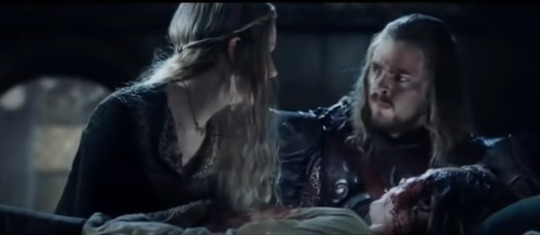
Eowyn then goes on to look at Theodred's wound. It's interesting that Eomer now looks curious above all things, he's waiting on Eowyn's judgement.
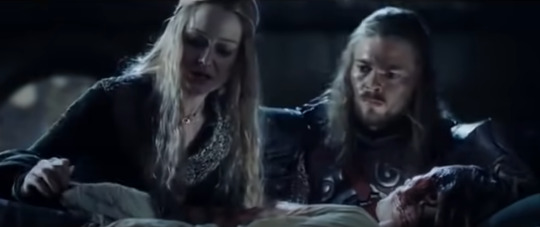
Eowyn looks at the wound and grimaces. It's bad. Theodred isn't going to survive this.
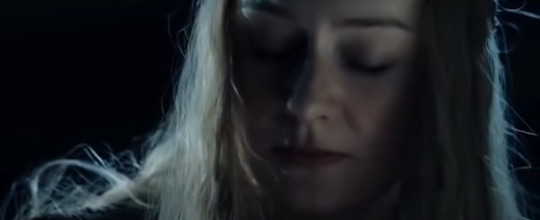
She looks to Eomer, who looks back at her in grim resignation.
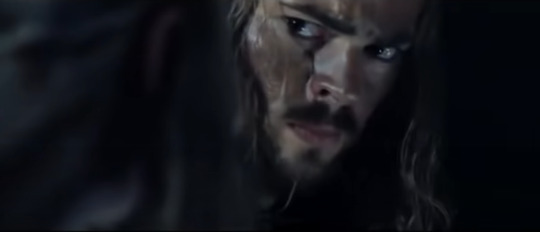
They go to Theoden to inform him of the situation. As Eomer walks by Eowyn, he doesn't speak to her or interrupt her, but he puts his hand on her back as he passes. Even when the focus is on other things, he is giving her that gesture of support and fondness. That it is done without fanfare shows that this sort of affection is commonplace.

They both stand before the throne, both of them united in their attempt to reach through to their uncle. They're a team, a unit.

Eomer throws down proof that Saruman, who Grima is trying to protray as a friend to Rohan, is sending his soldiers to terrorise their people.
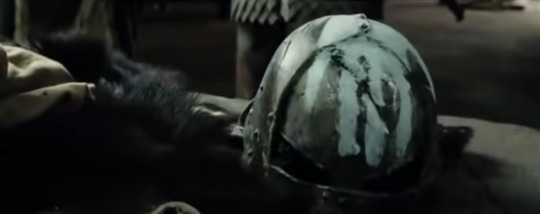
Eowyn gives Grima a death glare, challenging him to refute her brother's accusations. She's on Eomer's side, Eomer's team.
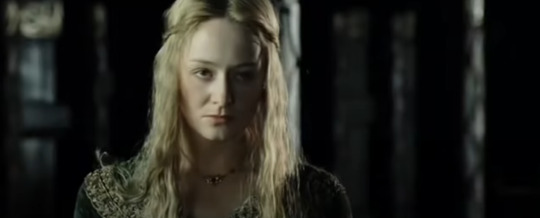
Eomer sees Grima looking at Eowyn, and knows what he wants. It fills him with fury.
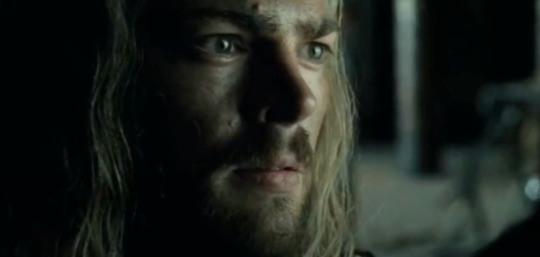
Eowyn sees her brother choking Grima against the wall. She looks on in cold silence, then walks away.
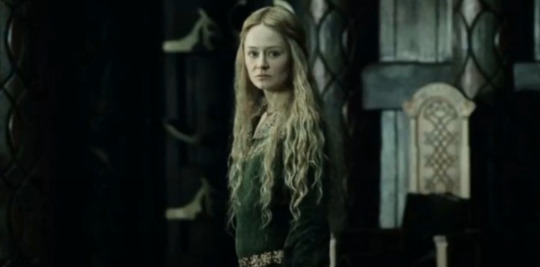
When Aragorn reveals that the beacons have been lit, Eowyn rushes into the throne room, drawing to a stop at Eomer's shoulder. They wait together for Theoden's judgement.

When it comes, and Theoden sends Eomer to muster the troops, Eomer bows, but even before he has fully straightened up, his eyes go to his sister.
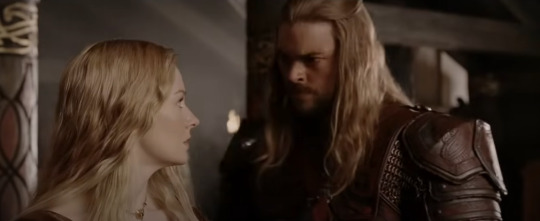
Again, no words exchanged, simply a look of common understanding. They both know what the risks are, they both know what is at stake, for the world, for their country, for their family.
Before Eomer leaves, he touches Eowyn's arm, before walking away.
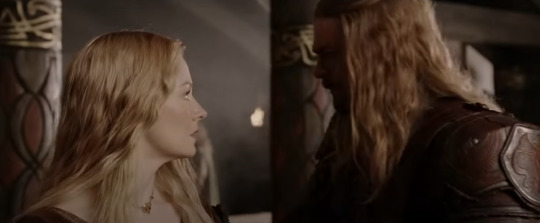
With Eomer gone, we see a steely determination come into Eowyn's eyes. Now there's something Eomer's missing, now Eomer's back is turn and there's something about sister that she's keeping from him. She's riding to battle.
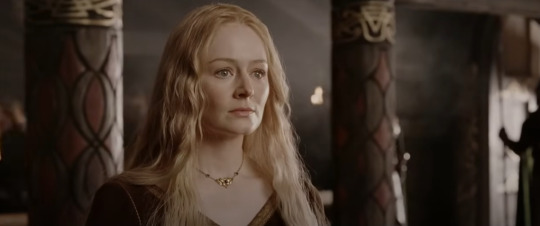
The one time they speak to each other, they're in opposition. About Merry, about Eowyn, about war.
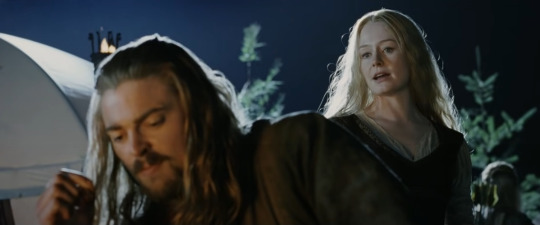
The words are harsh. Eomer is stern, Eowyn is defensive.
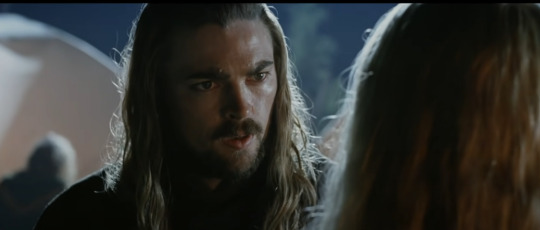
But Eomer puts his hand on Eowyn's shoulder. He doesn't say "I don't want you to get hurt, I don't want you in battle", but that hand on her shoulder, tells the audience that's exactly what he's saying.
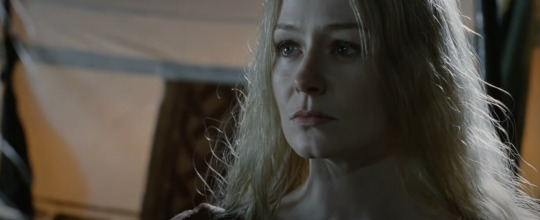
Those small moments of physical affection culminate in one great moment, when stern, stoic Eomer discovers Eowyn on the battle field, and breaks down in tears, cradling her and rocking her like she's a child.

And his devotion to her ultimately shown in him sitting small and hunched, tucked in on himself, crouching down in armour for what seems to have been a lengthy space of time, as he sits by her side, waiting for her to be healed.
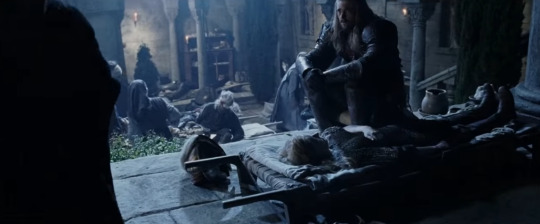
This is such an effective way of showing to an audience that two characters love each other, when there is a limited time window. The movie needed to crack on to cover the ground it needed to cover, and with so many important dynamics to reveal to the audience, the creators needed to be time effective. Eomer and Eowyn don't share much screen time, but the looks exchanged, the passing moments of intimacy, tells us clearly that these are two people greatly fond of each other, and have been fond of each other a long time.
The lack of spoken dialogue almost enhances it. Little is said between them because little needs to be said. They already know. The one time they do speak, it's when they're quarrelling, because that's the only moment when they need to use words. The rest of the time, a gesture, a look, is enough.
3K notes
·
View notes




